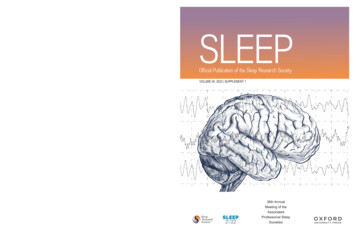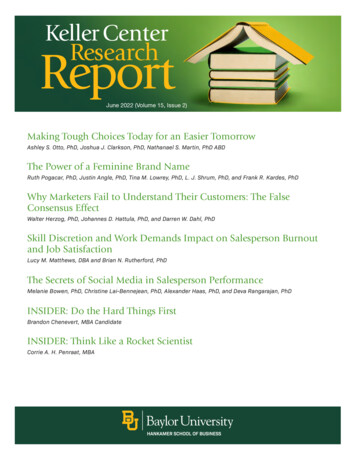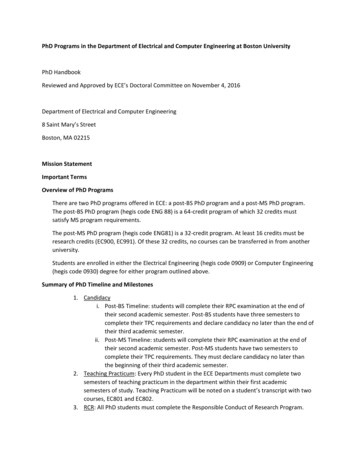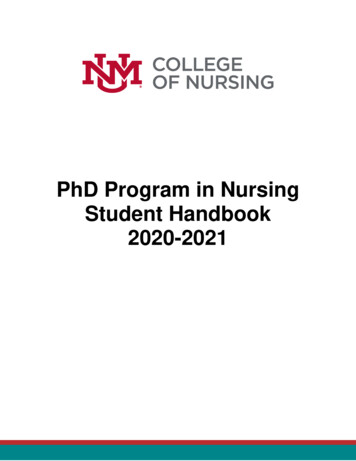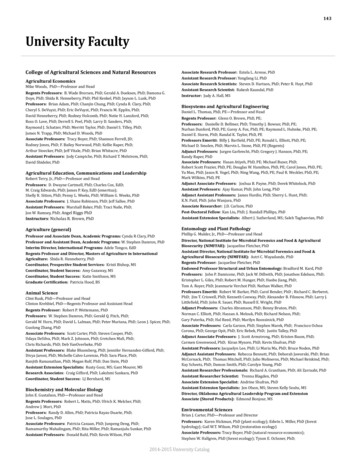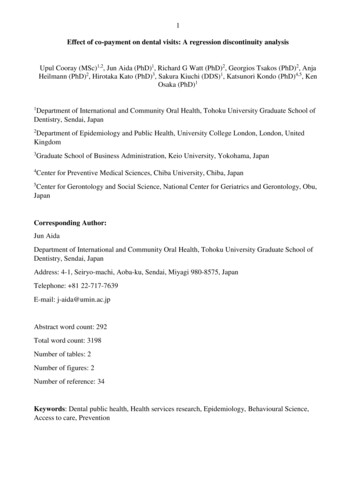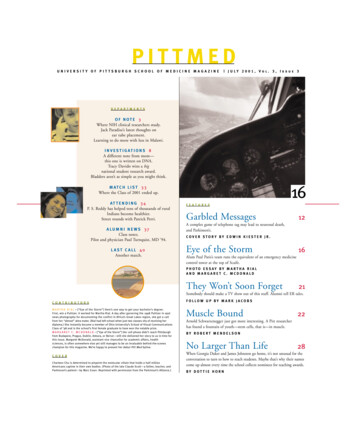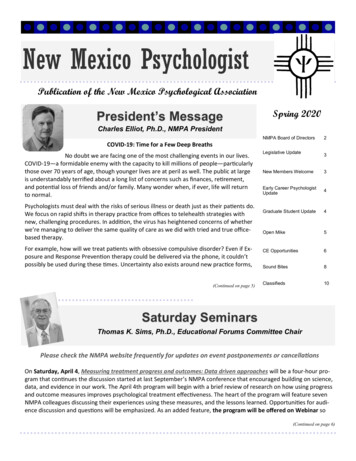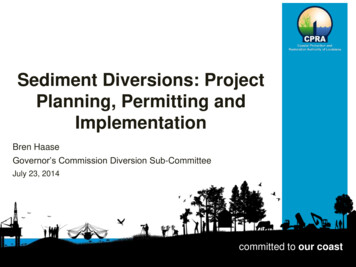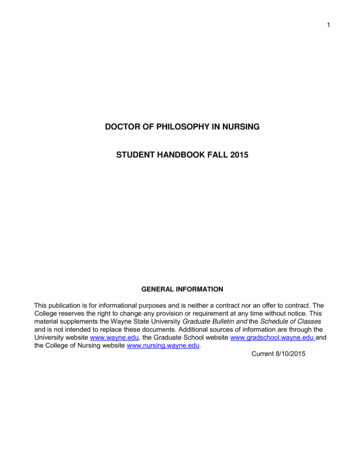
Transcription
1DOCTOR OF PHILOSOPHY IN NURSINGSTUDENT HANDBOOK FALL 2015GENERAL INFORMATIONThis publication is for informational purposes and is neither a contract nor an offer to contract. TheCollege reserves the right to change any provision or requirement at any time without notice. Thismaterial supplements the Wayne State University Graduate Bulletin and the Schedule of Classesand is not intended to replace these documents. Additional sources of information are through theUniversity website www.wayne.edu, the Graduate School website www.gradschool.wayne.edu andthe College of Nursing website www.nursing.wayne.edu.Current 8/10/2015
2Fall 2015Dear PhD Student:The faculty and staff of the College of Nursing welcome you to the PhD program at Wayne StateUniversity. We hope doctoral study will be an enlightening and productive experience for you. Thishandbook has been prepared to provide you with information to facilitate progression in yourprogram of study.We are extremely proud of the alumni of our PhD program in Nursing at Wayne State University.Over 200 researchers and scholars have graduated from the program since its inception in 1975.Our alumni are in leadership roles in research, education, practice, and administration throughoutthe United States, Canada and abroad. The contributions of our graduates to the discipline andprofession of nursing are recognized nationally and internationally.We wish you success in your program of study. If we can be of assistance, please contact ClintonLoh, PhD Program Secretary, at 313 577-4135 or Kristen Carney, Office of Student Affairs PhDStudent Advisor, at 313 577-4119.Sincerely,April Hazard Vallerand, PhD, RN, FAANInterim PhD Program Director
3OVERVIEWWAYNE STATE UNIVERSITYCOLLEGE OF NURSINGHISTORYThe Wayne State University College of Nursing began in 1930 as one of the departments of theCollege of Liberal Arts. During the first fifteen years, the nursing programs became so varied, theenrollment so large, and the contribution to the total community so important that reorganizationwas necessary. In 1944, at the request of the College of Liberal Arts, the Board of Educationauthorized the establishment of the Wayne University College of Nursing. The College began tofunction as one of the components of the University in the spring of 1945.In 1947 under the leadership of Katherine Faville, the College’s first dean, the faculty assumed fullresponsibility for teaching clinical nursing courses. This was the first time the shifting of clinicalteaching from hospital staff to nursing faculty was initiated. This model has now been incorporatedby colleges and schools of nursing nationwide. Graduates from the program were eligible to takethe Michigan examination for the registered nurse license.Since 1954, the College has offered programs leading to the degree of Master of Science inNursing. These programs offer advanced practice preparation for nurse practitioners and clinicalnurse specialists.In 1975, the College developed a Doctor of Philosophy in Nursing program. This was one of thefirst opportunities for doctoral study in the United States. To date, over 200 nurse scientists havereceived PhD degrees in nursing from Wayne State University.In 2008, the College established the Doctor of Nursing Practice program to develop clinicallyfocused advance practice leaders in nursing.MISSION STATEMENTThe ultimate mission of the Wayne State University PhD program in nursing is to improve the healthof individuals, families, and groups living in urban environments through the impact of our researchand the education of the next generation of nurse leaders. The program prepares nurse scientistsand scholars capable of conducting research, generating theory, and creating new knowledge thatadvances the science and practice of nursing. Our location within midtown Detroit provides uniqueopportunities to explore the interaction of biophysiologic, sociocultural, and environmental factors onthe health of urban populations. Areas of focus include the health of diverse, vulnerable populationsand persons with chronic diseases. The program seeks to attract highly-motivated, goal-orientedindividuals interested in a career in a research-intensive environment. Graduates of the programhold leadership positions in academia, government, health systems, and healthcare organizations.PHILOSOPHYThe College of Nursing functions within the context of Wayne State University and supports thecentral goals and mission of the university. These goals are to nurture the intellectual abilities of
4students and faculty and to provide education, research, and community service. As an urbanuniversity, Wayne State accepts responsibility for a reciprocal partnership with the community,using resources and knowledge in dealing with human life.Nursing is an academic discipline and profession. As a discipline, nursing develops its body ofknowledge using research as the major mode of discovery and validation. The scholarlyenvironment of the university enhances the research and theory development endeavors of theCollege of Nursing. As a profession, nursing uses knowledge creatively in response to the healthcare needs of society. Experience in a variety of clinical settings is the primary mode for thedevelopment of practice competencies. The urban context of the university provides a setting forexploring the application of knowledge to professional nursing practice.The concepts that order the discipline and profession of nursing are derived from knowledgeabout human beings, health care, and environment. These concepts give identity toprofessional nursing practice, direct inquiry, and theory development.The College of Nursing supports the importance of liberal arts, humanities, and sciences. Thefaculty believes that programs designed for the preparation of nurses must be composed of theintellectual, social, and technical components of a liberal and professional education that areavailable to students within an institution of higher learning. Faculty affirms the necessity and valueof clinical practice within a professional nursing program.The faculty believes that learners are self-directed and actively participate in the learning process.Self-direction encourages the development of personal goals and values significant to theprofession of nursing. Knowledge acquisition, capacity for critical inquiry, reflection and decisionmaking prepares learners to respond to issues that confront them as professionals. Learners fromdiverse backgrounds enter the College of Nursing to begin or continue their education within theacademic discipline of nursing. The faculty believes that the diverse characteristics of its studentsadd to the richness of the learning experience. The program seeks to accommodate the specialneeds, interests, and abilities of the students. The faculty supports the right of students to question,challenge, and debate within the context of inquiry as an essential ingredient in the student’sdevelopment. Continuing evaluation on the part of the students and faculty is essential to sustainthe integrity of the program.The faculty of the College of Nursing, as members of the academic community, recognizes that itsprofessional functions extend beyond contributions to formal teaching. Research, practice, andcommunity service are also expectations of the faculty role. The faculty views as essential:academic freedom, shared governance, opportunity to develop knowledge, and responsibility toincorporate new knowledge into teaching and nursing practice. The faculty assumes responsibilityfor enhancing the image of the College of Nursing and the University locally, nationally, andinternationally through various avenues including research, scholarship, practice, consultation, andparticipatory decision making.
5DeanLaurie Lauzon ClaboInterim Associate Dean forAcademic and Clinical AffairsInterim Associate DeanFor ResearchRamona BenkertApril Hazard VallerandAssistant DeanInterim PhD Program DirectorStudent AffairsApril Hazard VallerandDNP Program DirectorNancy GeorgeEric BrownInterim Assistant DeanInterim Assistant DeanFamily, Community, andAdult HealthMental HealthJanet HardenJanet HardenFacultyFacultyInterim Director ofInstructional TechnologyShari Burgess
6College of Nursing -Office of Student Affairs (OSA) – 10 Cohn313 577-4082, toll free 888 837-0847 FAX: 313 577-6949E-mail: nursinginfo@wayne.eduwebsite: www.nursing.wayne.eduSTUDENT SERVICESThe Office of Student Affairs (OSA) is responsible for a variety of activities, includingrecruitment, application, admission, orientation, retention, academic support, andundergraduate academic advising. The Office also manages the admissions, enrollment,registration, financial aid and the scholarship programs of the College.ADMINISTRATIONAreas of ResponsibilityEric Brown Assistant DeanAdministrative responsibility for the Office of Student Affairsfp9160@wayne.eduACADEMIC STAFFKristen Carney Academic Services Officer IV Admission to PhD Programei1812@wayne.eduAcademic Services Officer to admitted PhD studentsAdmission to BSN ProgramsAdvisor to admitted undergraduate students - last names M-ZFelicia Grace Academic Services Officer IVaa3882@wayne.eduAdvisor to admitted MSN students and Graduate CertificatesRecruitment for all programsAdmission for MSN and BSNDennis Beste Academic Services Officer Ifi6271@wayne.eduAdmission and Recruitment DNP ProgramAdmission to BSN ProgramsAdvisor to admitted undergraduate students – last names A-LSTUDENT ASSISTANTDeleanna AllenEw3755@wayne.eduAnswers phone, manages front desk, assists in day to dayoperations
7The Doctor of Philosophy in NursingThe College of Nursing, located in the culturally rich city of Detroit, draws its strength from the richtapestry of the urban experience. The Doctor of Philosophy in Nursing program began in 1975.Designed to prepare researchers and scholars who will provide leadership to the profession anddiscipline of nursing, the program emphasizes the development of the student’s capacity to makesignificant, original contributions to nursing knowledge.Mission StatementThe ultimate mission of the Wayne State University PhD program in nursing is to improve thehealth of individuals, families, and groups living in urban environments through the impact ofour research and the education of the next generation of nurse leaders. The program preparesnurse scientists and scholars capable of conducting research, generating theory, and creatingnew knowledge that advances the science and practice of nursing. Our location within midtownDetroit provides unique opportunities to explore the interaction of biophysiologic, sociocultural,and environmental factors on the health of urban populations. Areas of focus include the healthof diverse, vulnerable populations and persons with chronic diseases. The program seeks toattract highly-motivated, goal-oriented individuals interested in a career in a research-intensiveenvironment. Graduates of the program hold leadership positions in academia, government,health systems, and healthcare organizations.Students gain in-depth knowledge in domains integrating Urban Health with healthpromotion/risk reduction science and symptom science. Urban Health research focuses onquestions regarding the effects of urban environments on health behavior and health outcomes.The curriculum focuses on scientific inquiry and includes research methods, nursing theory,cognates, knowledge development, and the substantive domains of the discipline.Consistent with Wayne State University’s mission as a national research institution, facultyresearch is funded by the National Institutes of Health (NIH), foundations and other sources.The opportunities for collaborative research at facilities such as the Detroit Medical Center, anextensive network of hospitals and community health centers; the Wayne State UniversitySchool of Medicine, the Eugene Applebaum College of Pharmacy & Health Sciences, theInstitute of Gerontology, the Michigan Center for Urban African American Aging Research, andother schools enhance faculty research. The College of Nursing faculty's research generallyfocuses on symptom science and health promotion/risk reduction in the urban environment.Because programs of research evolve rapidly and shift in emphasis based on available funding,doctoral students should keep current with research faculty's programs of research byaccessing the College http://www.nursing.wayne.edu/ and Office for Health Research arch.php websites, the Faculty Research InterestGuide https://nursing.wayne.edu/pdfs/faculty research interest guide.pdf and requestingcopies of faculty research publications found posted on the OHR bulletin board.There are three paths for students to accomplish the requirements for the PhD degree inNursing. These paths offer options to applicants based on their present educational level andprofessional career pathway: Two of the paths are for students entering the program post-BSNand one path is for those entering post-MSN. Opportunities are available for full-time and parttime study although full-time study is strongly encouraged. The Three Paths are shown on theDoctoral Programs website: https://nursing.wayne.edu/phd/index.php
8ACADEMICSProgram OptionsCandidates for the Doctor of Philosophy in Nursing degree must complete a minimum of 90graduate credits beyond the baccalaureate degree. All course work must be completed inaccordance with the academic procedures of the College and the Graduate School governinggraduate scholarship and degrees.The three paths toward the PhD in Nursing degree reflect the diverse needs of nurse applicantswho differ in their backgrounds, their special interests, and their professional career pathways. Thethree paths offer options to applicants based on their present educational level and on the extent ofclinical specialization they desire. The options are consistent with the PhD program in nursing,which has prepared nurse leaders in research, theory, education, practice, and administration.MSN - PhD is designed for applicants entering the program with a Master’s degree in nursing and afocus on research and the generation of nursing knowledge.BSN – PhD Clinical Focus is a post-baccalaureate option with a focus on clinical specialization aswell as research and generation of nursing knowledge. Students who follow this path earn the PhDdegrees and are eligible to take the clinical specialization examination in their field of specialtystudy.BSN - PhD is an option intended for an applicant with a baccalaureate degree in nursing whosemajor focus is research and the development of nursing knowledge. Students who follow this pathwill earn a PhD degree.
9PhD Program PathwaysWayne State University PhD in NursingMSN-PhDBSN–PhD with Clinical FocusBSN-PhDPhD degree Focus: Research andPhD degree Focus: Research,PhD degree Focus: Research andNursing KnowledgeNursing Knowledge, and ClinicalNursing KnowledgeSpecialization (Michigan RNlicense required)Nursing Transfer CoursesAdvisor approved.Total 24 cr.Concentration coursesConcentration coursesConcentration coursesTo support the student’s research To support the student’s research To support the student’s researchinterest. Nine credits ofinterest. Nine of the 15 credits ofinterest. Nine credits ofconcentration must be taken outside concentration must be taken outsideconcentration must be takenof the College of Nursing.outside of the College of Nursing. of the College of Nursing.Total 9 cr.TheoryTotal 9 cr.TheoryNUR 8012 Philosophical Basisof Nursing 3 cr.NUR 8020 Theoretically-BasedNursing Inquiry 3 cr.NUR 7105 Theoretical Foundations NUR 7105 Theoretical Foundationsof Nursing 3 cr.of Nursing 3 cr.NUR 8012 Philosophical Basis of NUR 8012 Philosophical Basis ofNursing 3 cr.Nursing 3 cr.NUR 8020 Theoretically-BasedNUR 8020 Theoretically-BasedNursing Inquiry 3 cr.Nursing Inquiry 3 cr.Total 15 cr.TheoryTotal 6 cr.Total 9 cr.DOMAIN OF KNOWLEDGE: DOMAIN OF KNOWLEDGE:Total 9 cr.DOMAIN OF KNOWLEDGE:NUR 8011 Scientific Writing inNursing 1 cr.NUR 8210 Health and HealthDisparities 3 cr.NUR 8014 Health Interventions3 cr.NUR 8011 Scientific Writing inNursing1 cr.NUR 8210 Health and HealthDisparities 3 cr.NUR 8014 Health Interventions3 cr.NUR 8011 Scientific Writing inNursing 1 cr.NUR 8210 Health and HealthDisparities 3 cr.NUR 8014 Health Interventions3 cr.NUR 8630 ConceptualMethodologies in Health PolicyLeadership, and Ethics 3 cr.Total 7 cr.RESEARCH ANDSTATISTICSTotal 7 cr.Total 10 cr.RESEARCH AND STATISTICS RESEARCH AND STATISTICSNUR 8040 Research Methods:Quantitative 3 cr.NUR 8060 Research Methods:Qualitative 3 cr.NUR 7000 Statistics in Nursing OR NUR 7000 Statistics in Nursing ORNUR 8895 Population Health for NUR 8895 Population Health forNursing 3 cr.Nursing 3 cr.NUR 7015 Research for Evidence- NUR 7015 Research for EvidenceBased Advanced Nursing Practice I Based Advanced Nursing Practice I
10NUR 8610 Statistical Analysis I3 cr.NUR 8612 Statistical Analysis II3 cr.Advanced Research MethodsElective (from nursing or otherdiscipline) 3 cr.3 crNUR 8040 Research Methods:Quantitative 3 cr.NUR 8060 Research Methods:Qualitative 3 cr.NUR 8610 Statistical Analysis I3 cr.NUR 8612 Statistical Analysis II3 cr.Advanced Research MethodsElective (from nursing or otherdiscipline) 3 cr.Total 15 cr.Total 21 cr.Clinical Specialty:Total credits and additional coursesdependent upon chosen specialty.NUR 8630 ConceptualMethodologies in Health PolicyLeadership and Ethics 3 cr.NUR 7444 Advanced Physiologyand Pathophysiology across theLifespan 4 cr.NUR 7555 (or 7200 (NNP), 7207(PNP) Pharmacotherapeutics forAdvanced Practice 3 cr.NUR 7030 Advanced NursingAssessment 4 cr.NUR 8670 APN Specialty I 3-4 cr.NUR 8675 APN Clinical SpecialtyI 4-5 cr.NUR 8680 APN Specialty II 3-4 cr.NUR 8685 APN Clinical SpecialtyII 4-5 cr.NUR 8690 APN Specialty III 2-4 cr.NUR 8695 APN Clinical SpecialtyIII 4-6 cr.3 cr.NUR 8040 Research Methods:Quantitative 3 cr.NUR 8060 Research Methods:Qualitative 3 cr.NUR 8610 Statistical Analysis I 3cr.NUR 8612 StatisticalAnalysis II3 cr.Advanced Research MethodsElective (from nursing or otherdiscipline) 3 cr.NUR 8990 Pilot Research Study I3 cr.NUR 8990 Pilot Research Study II3 cr.Total 27 cr.38-49 cr. Depending on specialtyResidency (PhD requirement of 1 yr. of residence six graduate credits in course work, not dissertation,over two successive semesters. Spring/Summer Semester may be excluded.)Qualifying Examination (Completion of at least 50 credits of graduate level courses, including all Domainof Knowledge and Research/Statistics courses as stated on the student’s approved plan of work.)Candidacy (Qualifying Examination passed & Dissertation Committee approved.)Proposal defense (Students will need to complete all coursework as well as both the research andresidencies before defending the proposal.)
11NUR 9991Doctoral Candidate Status I: Dissertation Research and Direction 7.5 cr.NUR 9992 Doctoral Candidate Status II: Dissertation Research and Direction 7.5 cr.NUR 9993 Doctoral Candidate Status III: Dissertation Research and Direction 7.5 cr.NUR 9994 - Doctoral Candidate Status IV: Dissertation Research and Direction 7.5 cr.Total 30 cr.Program Minimum Total is 90 credits.Program Total 91 cr.Program Total 114-125 cr.Program Total 91 cr.The total PhD program must include thirty credits, excluding dissertation direction, in courses open only tograduate students (7000 level or above).
12Pre-Dissertation Research RequirementsFor students in the BSN-PhD (non-clinical focus) a 6 credit pilot research project must be completedbefore a student is eligible to take the Qualifying Examination and advance to Candidacy Status. .Forms for approval of the research requirements are found through the Doctoral Program website:http://nursing.wayne.edu and the Student Personal Page through the College of Nursing web site.The pilot research project must be in or definitely related to the student’s major field. Inconference with their research advisor, the student will consider the general area and nature of thestudy, its importance, the need for it, and the methods to be employed in conducting the study.PhD Program Research ResidencyDESCRIPTION:Prior to starting dissertation work, students are required to complete two semesters of a structured ResearchResidency. The Research Residency provides students with a mentored opportunity to obtain practicalexperience in various activities associated with conducting qualitative or quantitative research. Through theResearch Residency, students develop skills and knowledge that will assist them to carry out theirindependent research projects. The Research Residency may occur in conjunction with a graduateresearch assistantship appointment, may involve working on a faculty members’ research project, mayinvolve working with a large data set, or may be a pilot study to support the student’s dissertation work.LEARNER OUTCOMES:At the end of the research residencies, students are expected to document participation in a minimum of the5 of the 6 research activities listed below:1. Participate in proposal/planning or pre-award activity.2. Participate in study start-up activities (e.g., prepare IRB applications, data collection tools, recruitmenttools).3. Participate in data collection activities.4. Create a data base and manage files.5. Conduct data cleaning and initial analyses.6. Participate in at least one dissemination activity (e.g., create an abstract, power point presentation,manuscript draft).SPECIFICATIONS OF THE RESEARCH RESIDENCY:1. The student must complete the Doctoral Research Experience Agreement Form (obtained from thewebsite) prior to starting the research experience. The completed form must be signed by the student'sadvisor and the Program Director. A copy will remain in the student’s file in the PhD office.2. The student will work with his/her advisor and the Program Director to identify faculty mentors withinnursing and other disciplines, who are conducting research in an area of interest to the student.3. The research residency must be spread over at least two semesters, but semesters do not have to beconsecutive.4. Students are expected to work an average of 5 to 8 hours per week in research-related activities in eachof two semesters of the residency.
135. Students will successfully complete at least 5 of the 6 learning outcomes. In order to ensure that theminimal requirements are addressed the student, student's advisor, and faculty mentors will develop aresearch contract in advance to delineate expectations of each semester of the research residency.6. A new contract is required for the second semester of research residency, and the student may work witha different faculty mentor for each semester.7. At the end of each semester of the Research Residency, the Research Residency Evaluation Formmust be completed and signed by the student, mentor, and student's advisor. Once signed, the formis sent to the Program secretary for inclusion in the student's permanent file.[NOTE: This formalizes the former research practicum to ensure student's get experience in a variety ofresearch activities prior to starting their dissertation work].Institutional Review Board (IRB) Training & Submission RequirementsAll students must complete the online WSU IRB training requirement available at CITI. Also, allresearch being done by students must be approved by the Wayne State University InstitutionalReview Board (IRB). WSU IRB forms and information are on the websitehttp://www.irb.wayne.edu/. When researchers are students, they need a letter from their facultyadvisor and department chair that their research has been reviewed and is consistent with theWSU policies. If the research will not be conducted at WSU, a WSU consent form isn’t required aslong as WSU is included in the disclaimer of the other institution. For assistance in completingInstitutional Review Board (IRB) forms required for IRB approval, contact the IRB educationcoordinator 313 577-1628.Statistics RequirementThe statistics requirement for doctoral study is met by the completion of NUR 8610, Applied StatisticalAnalysis for Health I and NUR 8612, Applied Statistical Analysis for Health II.Concentration RequirementNine credits minimum of concentration courses are required to complete degree requirements. Aconcentration course is a class in a discipline or subject related to nursing but is offered by anotherdepartment or College. Concentration courses are intended to support coursework and allow thestudent to develop a focused specialty. The Concentration Plan Form must be completed andsigned by the student’s advisor and the Director of the PhD Program prior to takin a concentrationcourse. This form is intended to outline the concentration courses and justify their relevance to thestudent’s plan of work. A concentration advisor is selected to serve on the Qualifying Examinationand Dissertation Committees. The expertise of this extra-departmental member must be appropriateto the student’s dissertation work. The academic advisor will advise the student in the selection ofthe cognate advisor.PhD Program Teaching ResidencyDESCRIPTION:Prior to graduation, all PhD students are expected to complete one semester of a structured, mentoredTeaching Residency. The purpose of the mentored teaching residency is to provide PhD students with an
14opportunity to gain experience in applying teaching/learning principles to student groups. Students will learnspecific teaching methods, classroom management, evaluation strategies, and how to develop teacherstudent relationships. The Teaching Residency may occur in conjunction with a graduate teachingassistantship (non-clinical practicum appointment), or may be satisfied by evidence of other academic, nonclinical teaching experience, as determined by the student's advisor and the Program Director.LEARNER OUTCOMES:At the end of the teaching residency, students will be able to:1. Demonstrate ability to structure and implement at least two learning modules.2. Create evaluation plans for determining student learning outcomes.3. Demonstrate beginning effectiveness in a variety of teaching strategies.4. Critique their own teaching performance through self-assessment and evaluation.SPECIFICATIONS OF THE TEACHING RESIDENCY:1. The student must complete the Teaching Residency Request Form (obtained from the website) prior tothe teaching experience. The completed form must be signed by the faculty mentor and the ProgramDirector. A copy will remain in the student’s file in the PhD office.2. The student will work with his/her advisor and the Program Director to identify experienced facultymentors who are teaching in an area of interest to the student.3. The student and faculty develop a teaching contract in advance to delineate expectations of the teachingexperience. The contract will address which aspects of teaching that will have student involvement asappropriate to the students' learning needs. Examples of teaching experiences may include developing orrevising a course syllabus, discussing and participating where possible in developing courseassignments, and grading. In addition, each student is expected to:a. Prepare and present a minimum of two teaching interactions during the semester (includesteaching plan, assigned readings, class objectives, and evaluation strategies).b. Contribute to the evaluation of grading (e.g., test construction and analysis).c. Participate in the course throughout the semester including determination of final coursegrades.4. The faculty mentor will observe the student teach (e.g., in the classroom, via online discussion forums).Following the class the student will do a self-evaluation and then meet with the faculty to discuss thestudent and faculty's evaluation of the student's performance. They will discuss any classroom/learningproblems identified and work together to resolve them.5. Develop a beginning philosophy of teaching.6. At the end of the Teaching Residency, Teaching Residency Evaluation Form is completed and signed byboth student and mentor indicating that the student has completed this requirement of the doctoralprogram. Once signed, the form is then sent to the Program secretary for inclusion in the student'spermanent file.[NOTE: This is a new requirement done to meet the AACN's curricular elements related to educating the nextgeneration. Previous PhD committees have addressed this issue given that the majority of PhD graduates willbe employed in academic institutions this was deemed an important aspect of transitioning to their professionalrole].
15Dissertation ColloquiaDESCRIPTION:Dissertation seminars are designed to facilitate socialization to the professional role and assist in the transitionfrom student to doctorally-prepared nurse scholar and scientist. The colloquia also provide collegial supportand an opportunity for students to discuss their research during the dissertation phase of the program. Colloquiawill meet biweekly for two hours in Fall and Winter semesters. Fall semester seminars will include an emphasison Career Transition while Winter semester seminars will include an emphasis on Policy and Leadership.Students are expected to attend 90% of both a Fall and Winter seminar (Two hours biweekly while registeredfor NUR 9991-9995) prior to graduation, but are encouraged to continue attending seminars until they havesuccessfully defended their dissertation.LEARNING OUTCOME:Upon completion of the seminars, students will be able to:1.Describe their 'next steps' in professional development (e.g., consider post-doctoral programs,determining potential funding sources for their next study, negotiating the first professional appointment).2.Discuss the role of the PhD-prepared nurse in health policy.3.Examine leadership of PhD-prepared nurses related to policy, profes
DOCTOR OF PHILOSOPHY IN NURSING . STUDENT HANDBOOK FALL 2015 . University website www.wayne.edu, the Graduate School website www.gradschool.wayne.edu and . The ultimate mission of the Wayne State University PhD program in nursing is to improve the health of individuals, families, and groups living in urban environments through the impact of .
